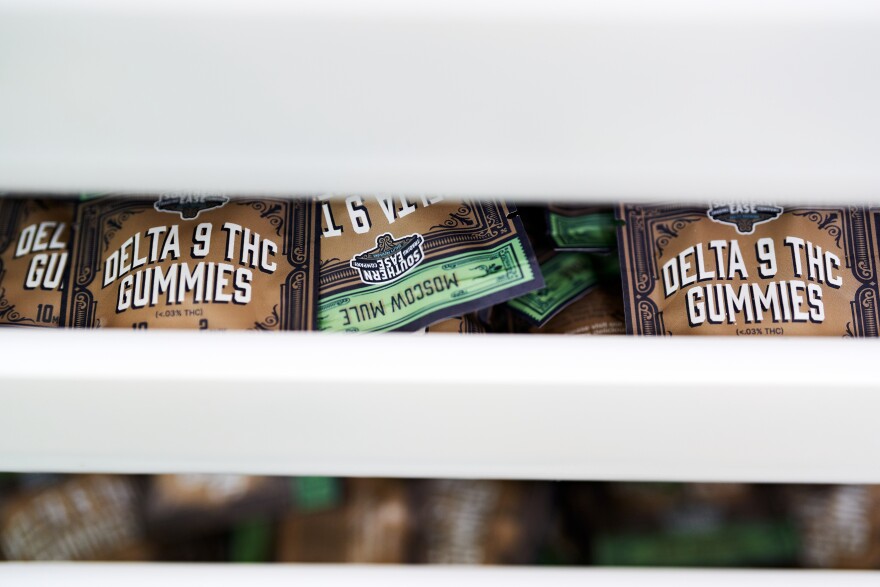CBD, hemp, and other products that contain the active ingredient from marijuana are sold in North Carolina with few regulations. An effort in the state legislature aims to change that.
One of the models lawmakers may consider is Asterra Labs, which produces Delta 9 and CBD products at a small manufacturing facility in the town of Nashville, near Rocky Mount. On a recent Wednesday, workers there dressed in hairnets and white lab coats were producing gummies, vape pens, and other items that contain hemp or THC.

The production process at Asterra Labs looks a lot like what you’d see at a traditional pharmaceutical plant, and that’s their goal. But the safety and quality control measures used here aren’t required by law.
"This is the problem with the way we're dealing with this in North Carolina, is that we have no regulations, it's the Wild, Wild West," said John Bell, the company's president. While Asterra has a "pharmaceutical-grade clean facility where you can eat off the floor," he says, "we're competing in the same market space as a guy who's making it in their backyard."

Bell is leading the company, but he's better known for his other job: The Republican majority leader in the state House. He took on the role last year as the legislature considers bills that would regulate the sales and production of these relatively new products. It's part of his work with Asterra's parent company, Greenville-based Rise Capital, led by former UNC Board of Governors Chairman Harry Smith.
Bell has been giving his legislative colleagues tours of the facility and explaining the industry.
"The bills that we're talking about, let me show you why we're talking about it," he tells his fellow lawmakers. "Let me show you why regulations are important. Let me show you how it's done the right way."
When the bill comes up in the legislature, Bell says he’ll seek an ethics opinion on whether he should recuse himself due to his role at Asterra Labs.
Asterra makes a range of products both for other brands and for its in-house label, . Flavors of gummies range from bourbon to margarita.

The gummies look a lot like candy. North Carolina currently doesn’t have age requirements to buy these types of products.
Even retailers who only sell to adults are often selling potentially harmful CBD and hemp products. Michael Horton runs Delta 9 Analytical, a lab in Raleigh that tests what’s in the products.
"If you're eating something that you see in a store that's marketed for consumers, that's marketed to eat, you assume that it's safe to eat," Horton said. "Those assumptions aren't correct in this industry yet."
Horton says some of the products he’s tested are contaminated with heavy metals that can pose long-term health risks. Others simply apply the active ingredients to the products inconsistently, making it impossible to know what dosage you’re taking.
"You take this thinking that you're going to sit down and relax, watch some TV," Horton said, "and suddenly you're not doing any of those things. You're completely incapacitated on your couch and, 'oh my God, what have I done?'"
There have been multiple reports of kids and teens being hospitalized in North Carolina and elsewhere after taking CBD and hemp products.
Horton says hemp legalization opened the floodgates for these new products several years ago. Heating up some of the Delta 9 products now available in North Carolina creates the same chemical composition as a marijuana product on the market in sales where the drug has been legalized.
"Marijuana has been legal for a while now — we just didn't realize it," he said.
But while state lawmakers are considering putting more regulations on hemp and CBD products, even a limited legalization of medical marijuana has struggled to find support in the GOP House.
Bell draws a strict distinction between marijuana and the products his company produces.
"The one thing that I want to stress is that Asterra Labs is not in the marijuana business," he said. "We're in the CBD and hemp business."

The Senate hasn’t yet taken action on the bill that passed the House last year with CBD and hemp regulations, but that chamber did vote to legalize medical marijuana.
Asked if the hemp bill has a shot in the Senate this year, Senate leader Phil Berger offered a "maybe" as the session began last week.
"We’d certainly like to deal with not just CBD but medical marijuana, and maybe there's a way we can work something out on that," he said, suggesting that the two bills might be combined in a compromise between the two chambers.
would penalize retailers who sell hemp products to people under age 18. And it would require manufacturers to limit the amount of THC in their products and have them tested by an independent lab. The bill also includes similar regulations for kratom, an increasingly popular herbal substance that has opioid and stimulant-like effects.
Horton said he's supportive of the House measure.
"I think it's going to be one of the most stringent in the country," he said. "It addresses all of those issues."
The vote in the House was unanimous.







